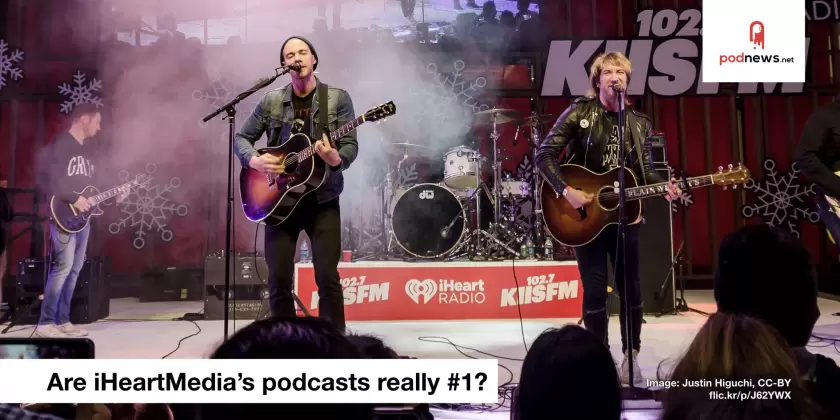
Is iHeartMedia really the leader in 'snackable' podcasts?

This article is at least a year old
EXCLUSIVE Are iHeartMedia podcasts the most listened-to short-form podcasts? No. We’ve discovered that Podtrac’s measurement hasn’t been measuring listening, but something else entirely - the total pageviews for all of iHeartMedia’s 850 radio stations. No wonder they’re #1.
Below, we examine, in depth, how this has happened: and a simple test to check if other podcast publishers are also making the same mistake.
Podtrac, the analytics measurement company, published a new chart on December 25th 2017: the “Top 15 snackable podcasts” (as we reported in our free daily podcast briefing). In an email release, the company noted that changes in the podcast market would “call for shorter podcast content in the coming months”.
Podtrac’s overall data showed iHeartMedia was the second most popular podcast publisher in November 2017, according to unique monthly audience in the US. Its new “snackable podcasts” list, listing podcasts of less than ten minutes in duration, had six podcasts in the top ten from iHeartMedia, including the top three. Commercial radio rules short-form podcasts, says an industry website. iHeartMedia must be delighted.
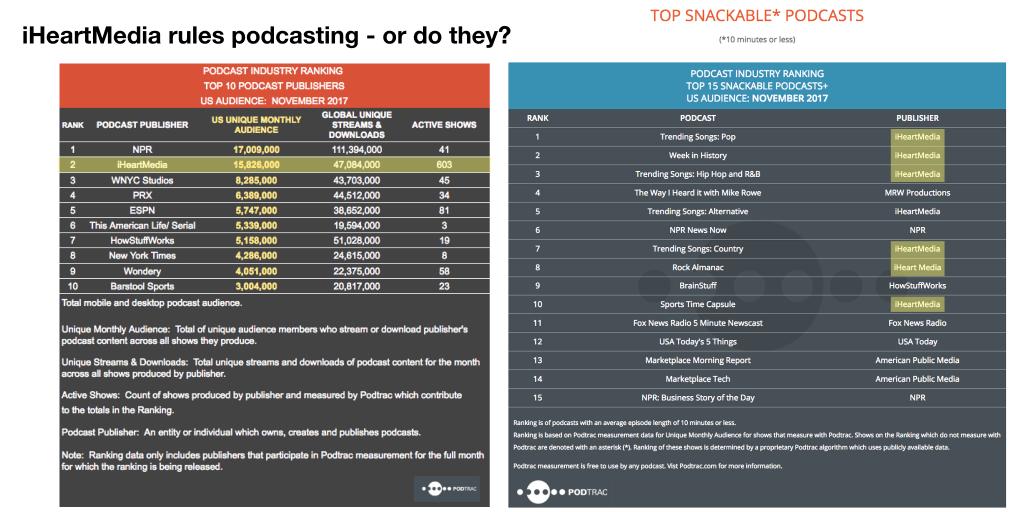
The most popular from iHeartMedia are Trending Songs: Pop and Week in History. Trending Songs: Pop is a short, 68 second, chart containing five short song hooks, designed to promote iHeartRadio, the company’s mobile app. Week in History is a short, 98 second piece of audio which is not branded iHeartRadio, and consists of a read list of historical events separated by production elements.
These are two competently-produced podcasts; but a number of podcast professionals were curious. Editorially, they weren’t obviously chart-toppers. Mike Agovino, formerly of Triton Digital, wrote a critical post on LinkedIn, which we reported on Nov 20, suggesting that these podcasts were being fed as part of something else. Another correspondent privately e-mailed us, saying:
The whole thing smells bad. It’s like learning that some online video show that is not on YouTube, not on Netflix, not on Hulu, and not on Amazon and that no major players in the industry have ever even heard of is the most streamed TV show. Wouldn’t everyone look at that and go ‘what the…?’
Today, we can reveal exactly how they appear to be #1 - and how it could have happened without a single pair of ears ever hearing the audio.
How Podtrac measures podcasts
Podtrac publishes its measurement methodology online, though a clearer understanding of how Podtrac works can be gained from their documentation on how to measure your podcast.
A publisher adds a Podtrac tracking prefix to the audio file name. When a podcast client requests a podcast that Podtrac is measuring, it asks the Podtrac server for the audio file. This server acts as a hit-counter, making a record of the file request, and then (through a 302 Temporary Redirect) telling the podcast client where to find the actual audio - pointing to a publisher’s own audio podcast host (for example, Spreaker).
Podtrac is able to then use what it describes as “proprietary analysis algorithms” to ensure that multiple file requests are ignored, and captures additional data like the user’s location, device and IP address.
While Podtrac is a good and trustworthy service if used as directed, it’s important to note that Podtrac can only measure total requests (which it attempts to ensure are unique). It can’t measure plays.
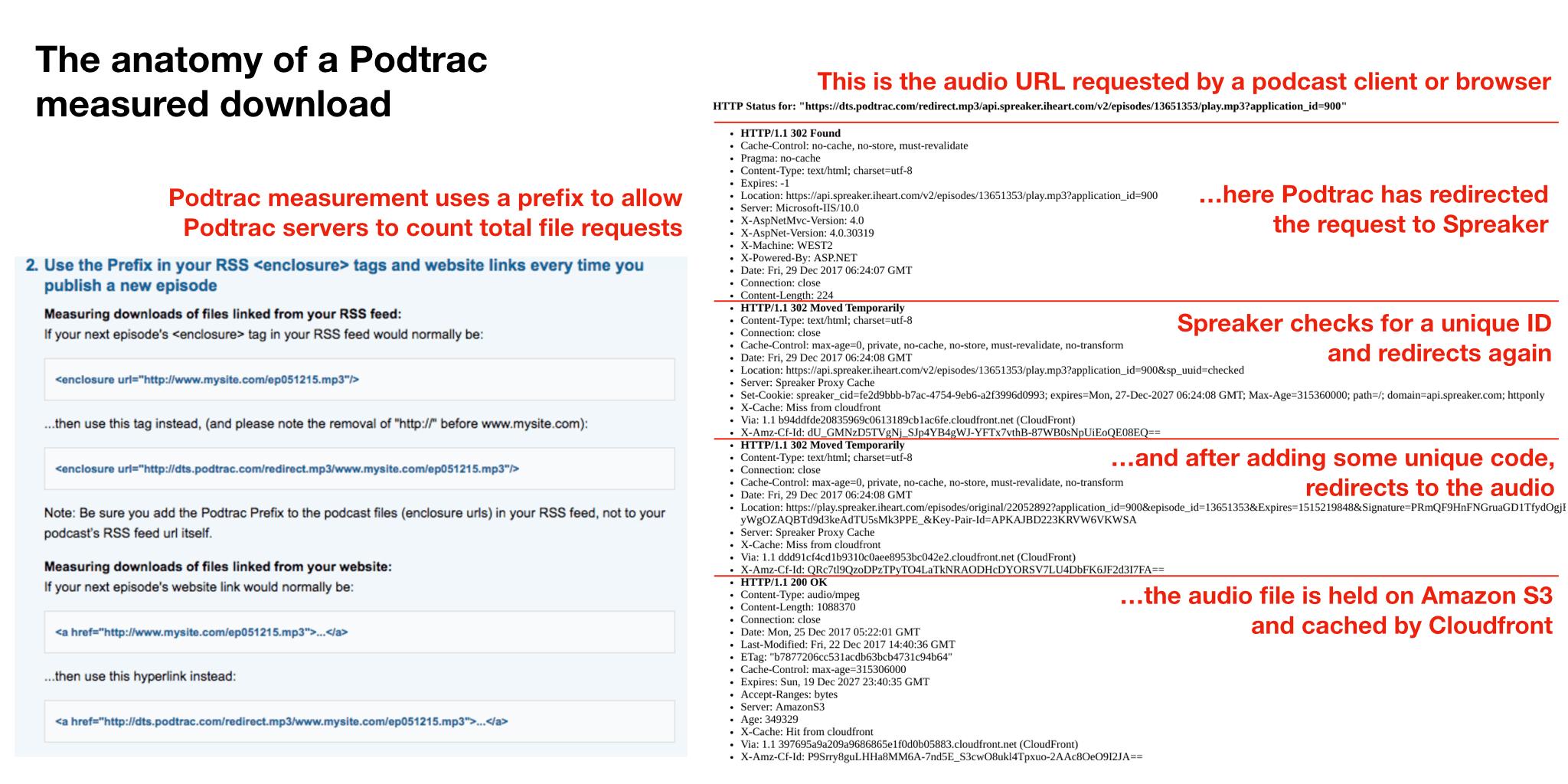
The iHeartMedia podcasts
The apparent #1 snackable podcast, Trending Songs: Pop, is listed in iTunes. Week in History, the #2 podcast, is listed in iTunes too. Both of these use the Podtrac tracking prefix.
However: they don’t look like the US’s biggest podcasts. They are listed as being authored by “Default (DEFAULT)”, rather than any iHeartMedia brand. Shownotes for the podcasts are non-existent, and the podcasts’ artwork is functional but uninspiring.
A search in the Apple Podcasts app for Week in History doesn’t return the iHeartMedia one as the first response (the order is understood to be based on popularity). Week in History performs oddly in Google searches, too - while a search for the podcast finds an iHeartRadio link on the first page, it wasn’t #1 for us, and this link also leads to a broken page. It’s unlikely that this podcast is, by itself, optimised enough to be a #2 US podcast.
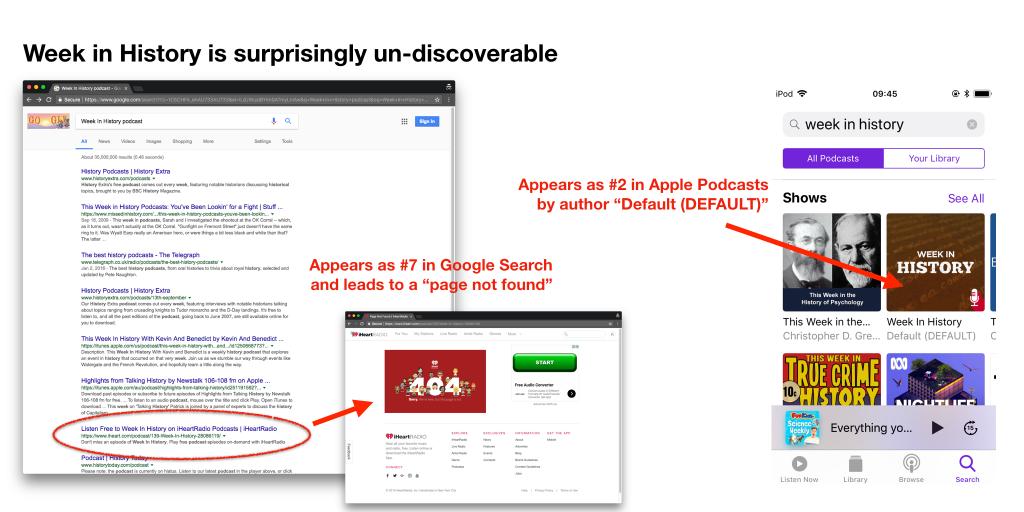
The iHeart radio station websites
iHeartMedia owns and operates more than 850 radio stations, each of whom have a website of their own. In total, iheart.com is the 660th most popular website in the US.
When we looked at the website for Z100, the top40 station in New York NY, half-way down the front page we observed a large right-hand widget for Trending Songs: Pop. This contains a play button which, when pressed, plays the podcast.
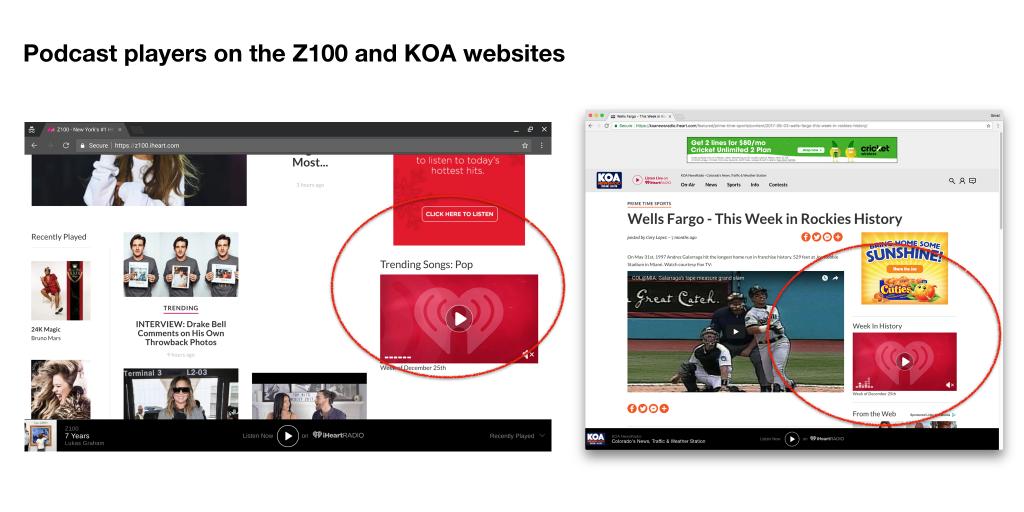
The company’s KOA News Radio also contains a similar player widget marked Week in History. It’s likely, therefore, that Trending Songs: Pop is content available for all top40 stations, while news/talk stations get Week in History as a playable widget.
Viewing the source of the page, these players are embedded IFRAMES; so we went directly to view the source of the player IFRAME. In the player source we found the Podtrac tracking prefix. So, when you hit “play” in these embedded players, the request for the audio will be tracked by Podtrac.
The embedded player is well-designed. It appears to be bespoke code by iHeartMedia, and uses Lotame second-party data to enable targeted preroll advertisements, as well as custom analytics and support for mobile devices. It also links to Omniture, Google Analytics, and other services. And, like any good embedded media player, it pre-loads the audio so that it knows that it exists and will start instantly when a user selects it. It preloads all of the audio automatically, without the user having to hit play.
This can be verified this by using Chrome’s “inspect” network pane. Two requests to the podcast were seen being made when loading the player. The HTTP “Range” header asks for the entire file (“0-”), and the entire 1MB file is downloaded. This looks like a full audio download - because it is.
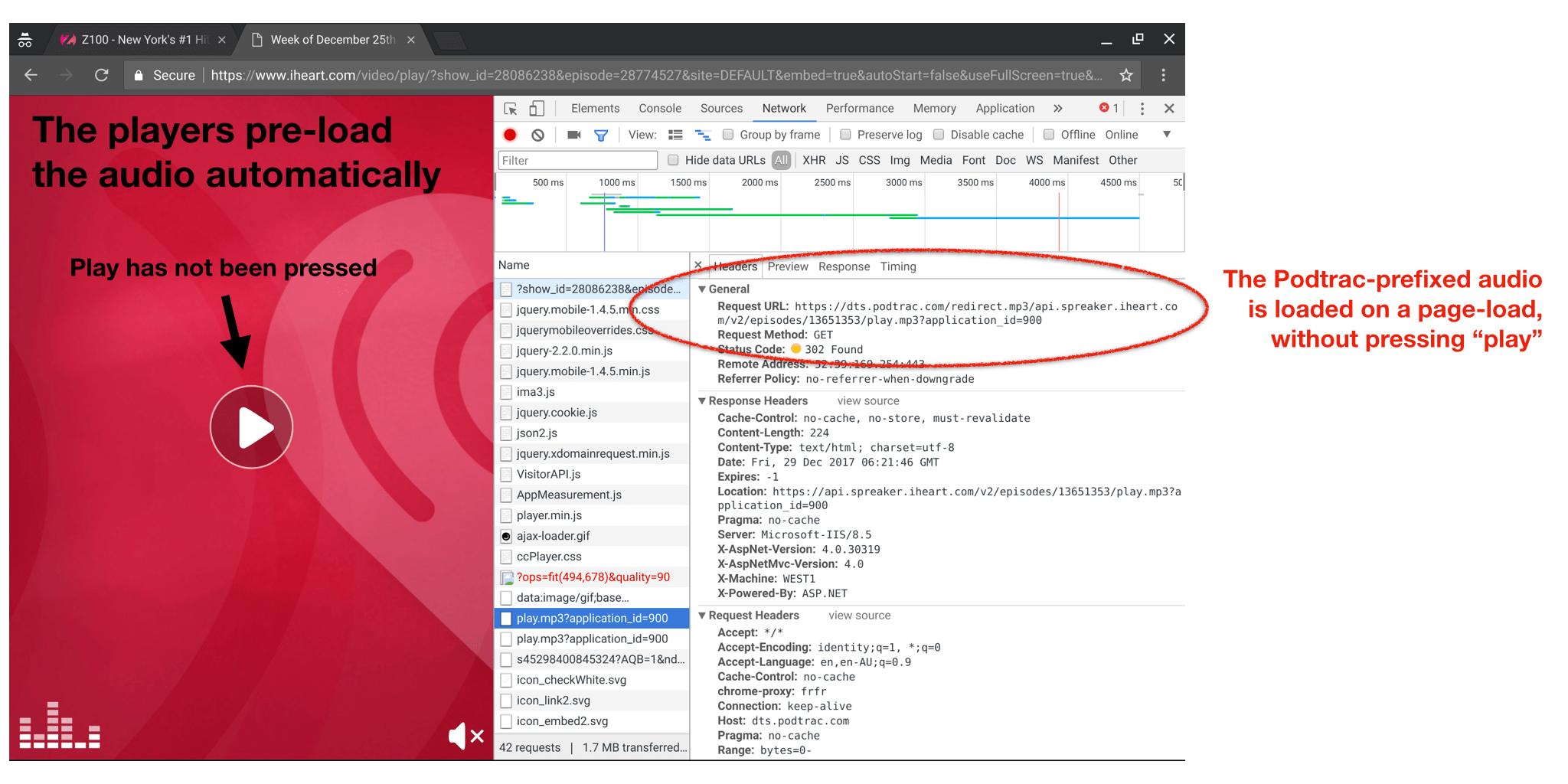
The problem
- Podtrac measures total unique requests for a podcast audio file.
- The podcast player widget appears whenever you load a page on iHeartMedia’s 850 radio station websites.
- The player itself requests the whole podcast audio file automatically when it loads, without a user pressing play.
- Every page load on over 850 radio station websites, where that player is present, is being tracked by Podtrac as a “listen”, irrespective of whether the user presses play.
- Podtrac is effectively measuring total page impressions to iHeart’s 850 radio station websites, and not actual podcast plays.
We checked other podcasts on the list. Mike Rowe’s podcast The Way I Heard It, which is #4 in the chart: his website has an embedded player but it does not pre-load the audio until a user has hit play. NPR’s News Now is at #5, but its podcast player does not pre-load audio. American Public Media, too, has an embedded player, but it does not pre-load audio either.
The iHeartMedia podcast figures are highly over-stated
So, perhaps inadvertently, the pre-loading behaviour of the iHeartMedia Player makes the data wildly inaccurate.
The player has the appearance of an ad - and an ad like this has an industry average clickthrough rate of 0.05%. In other words, this player would be shown 2,000 times on average to get just one person hitting “play”. Yet, the audio will have been requested 2,000 times, and will have been recorded as 2,000 plays by Podtrac.
It’s theoretically possible for these podcasts to be hitting the top of the charts without anyone at all ever actually listening to them.
So why didn’t Podtrac notice? Podtrac measures the devices on which podcasts are being downloaded on, as one Podtrac user has screenshotted. Had Podtrac done a cursory check of their data for these podcasts, they’d have found a suspiciously high percentage of browser downloads - way over the average. This should have begun to ring alarm bells.
Podtrac needs people to have faith in their stats. Another part of the organisation, Authentic Shows, sells podcast advertising based on these numbers. The last thing the podcast industry needs is a perception that the system is easily gamed.
Podtrac have been repeatedly questioned about these podcasts, but they have repeatedly stated that the podcasts fulfil all the “technical definition and delivery rules of a podcast”. A cursory check should have made this issue obvious.
Podcast professionals that we’ve spoken to have confirmed this is not the first time that pre-loading audio has caused incorrect stats. So why didn’t Podtrac check their own data?
We contacted iHeartMedia and Podtrac with our findings
We shared our technical findings with iHeartMedia and Podtrac, notifying them four days before publishing this story.
A Podtrac representative told us:
Podtrac measures podcasts across a variety of podcast apps, devices and sites. We encourage developers to adhere to IAB guidelines for podcast client behavior, and we evaluate various sources periodically. Podcast traffic by source varies somewhat per show, but we generally don’t release specific counts or percentages by show. Nor do we publish our proprietary podcast traffic analysis algorithms that run on top of our measurement system. Podtrac rankings are across all sources of podcast traffic and are based on unique audience - not downloads.
We reached out to three iHeartMedia individuals, including an on-duty PR executive. However, by press time, iHeartMedia had not offered us a comment.
UPDATE: Less than 14 hours after we published this story, Podtrac silently removed iHeartMedia from their ranking charts.
Is this happening to your podcast?
- Check that your player isn’t pre-loading audio. Here’s how, using Google Chrome:
- From the Chrome menu, open a new incognito window (so your normal extensions won’t interfere)
- Right-click the page on an empty section and choose “Inspect”
- Click “Network” in the tab list
- Visit https://z100.iheart.com and let it load
- Type “.mp3” into the box marked 'filter’
- The file requests you see below are .mp3 audio files that your browser has automatically requested. Hover over the top two to see the Podtrac tracking prefix, which means these count as a play in Podtrac’s stats.
What we’ve learnt
The appearance of these podcasts in the charts has caused considerable disbelief and debate in the podcasting world, which we’ve reported on for months.
It’s probable that iHeartMedia’s technical team inadvertently chosen to pre-load audio, not understanding the issues this would cause.
But as we show today, if something looks wrong and sounds wrong, it probably is wrong. We look forward to reporting the corrected figures in our daily email briefing.































































































